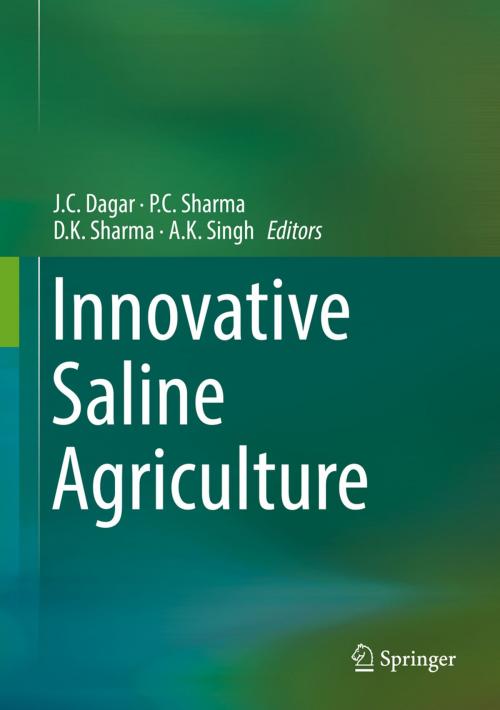Innovative Saline Agriculture
Nonfiction, Science & Nature, Technology, Agriculture & Animal Husbandry, Science, Earth Sciences| Author: | ISBN: | 9788132227700 | |
| Publisher: | Springer India | Publication: | August 10, 2016 |
| Imprint: | Springer | Language: | English |
| Author: | |
| ISBN: | 9788132227700 |
| Publisher: | Springer India |
| Publication: | August 10, 2016 |
| Imprint: | Springer |
| Language: | English |
The land degradation due to salinity and waterlogging is a global phenomenon, afflicting about one billion hectares within the sovereign borders of at least 75 countries. Besides staring at the food security, it has far reaching and unacceptable socio-economic consequences since a large proportion of this land is inhabited by smallholder farmers. The anthropogenic-environmental changes and the climate change are further adding to the problem of salinity and waterlogging. The phenomenon of sea-level rise will bring more areas under waterlogged salinity due to inundation by sea water. Thus, dealing with the salinity in reality is becoming a highly onerous task owing to its complex nature, uncertainty and differential temporal and spatial impacts. Nevertheless, with the need to provide more food, feed, fuel, fodder and fiber to the expanding population, and non-availability of new productive land, there is a need for productivity enhancement of these lands. In fact, the salt-affected and waterlogged lands cannot be neglected since huge investments have been made throughout the world in the development of irrigation and drainage infrastructure. The social, economic and environmental costs being high for theon-and/off-farm reclamation techniques, saline agriculture including agroforestry inculcated with modern innovative techniques, is now emerging as a potential tool not only for arresting salinity and waterlogging but for other environmental services like mitigate climate change, sequester carbon and biodiversity restoration. This publication attempts to address a wide range of issues, principles and practices related to the salinity involved in rehabilitation of waterlogged saline soils and judicious use of saline waters including sea water. Many of the site specific case studies typical to the saline environment including coastal ecologies sustaining productivity, rendering environmental services, conserving biodiversity and mitigating climate change have been described in detail. Written by leading researchers and experts of their own fields, the book is a must, not only for salinity experts but also for policy makers, environmentalists, students and educationists alike. More importantly, it contributes to reversing the salinity trends and teaches to sustain with salinity ensuring the livelihood of resource-poor farming families leaving in harsh ecologies including coastal areas which are more vulnerable to climate change.
The land degradation due to salinity and waterlogging is a global phenomenon, afflicting about one billion hectares within the sovereign borders of at least 75 countries. Besides staring at the food security, it has far reaching and unacceptable socio-economic consequences since a large proportion of this land is inhabited by smallholder farmers. The anthropogenic-environmental changes and the climate change are further adding to the problem of salinity and waterlogging. The phenomenon of sea-level rise will bring more areas under waterlogged salinity due to inundation by sea water. Thus, dealing with the salinity in reality is becoming a highly onerous task owing to its complex nature, uncertainty and differential temporal and spatial impacts. Nevertheless, with the need to provide more food, feed, fuel, fodder and fiber to the expanding population, and non-availability of new productive land, there is a need for productivity enhancement of these lands. In fact, the salt-affected and waterlogged lands cannot be neglected since huge investments have been made throughout the world in the development of irrigation and drainage infrastructure. The social, economic and environmental costs being high for theon-and/off-farm reclamation techniques, saline agriculture including agroforestry inculcated with modern innovative techniques, is now emerging as a potential tool not only for arresting salinity and waterlogging but for other environmental services like mitigate climate change, sequester carbon and biodiversity restoration. This publication attempts to address a wide range of issues, principles and practices related to the salinity involved in rehabilitation of waterlogged saline soils and judicious use of saline waters including sea water. Many of the site specific case studies typical to the saline environment including coastal ecologies sustaining productivity, rendering environmental services, conserving biodiversity and mitigating climate change have been described in detail. Written by leading researchers and experts of their own fields, the book is a must, not only for salinity experts but also for policy makers, environmentalists, students and educationists alike. More importantly, it contributes to reversing the salinity trends and teaches to sustain with salinity ensuring the livelihood of resource-poor farming families leaving in harsh ecologies including coastal areas which are more vulnerable to climate change.















